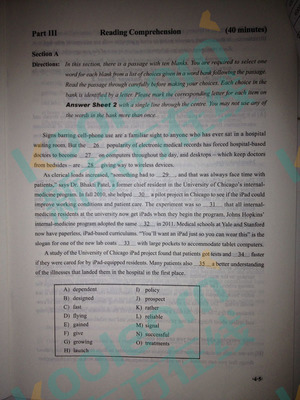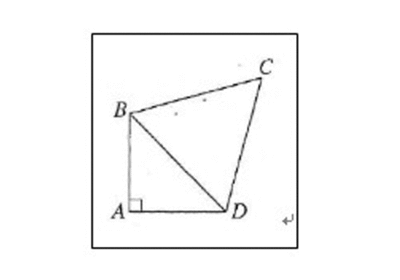Part II Scanning and Skimming (15minutes)
Media Selection for Advertisements
After determining the target audience for a product or service,advertising agencies must select the appropriate media for theadvertisement. We discuss here the major types of media used inadvertising. We focus our attention on seven types of advertising:television, newspapers, radio, magazines, out-of-home, internet anddirect mail.
Television
Television is an attractive medium for advertising because itdelivers mass audiences to advertisers. When you consider thatnearly three out of four Americans have seen the game show WhoWants to Be a Millionaire? You can understand the power oftelevision to communicate with a large audience. When advertiserscreate a brand, for example, they want to impress consumers withthe brand and its image. Television provides an ideal vehicle forthis type of communication. But television is an expensive medium,and not all advertisers can afford to use it.
Television's influence on advertising is fourfold.First, narrowcasting means that television channels are seen by anincreasingly narrow segment of the audience. The Golf Channel, forinstance.
is watched by people who play golf. Home and Garden Television isseen by those interested in household improvement projects. Thus,audiences are smaller and more homogeneous(具有共同特点的) than they havebeen in the past. Second, there is an increase in the number oftelevision channels available to viewers, and thus, advertisers.This has also resulted in an increase in the sheer number ofadvertisements to which audiences are exposed. Third, digitalrecording devices allow audience members more control over whichcommercials they watch. Fourth, control over programming is beingpassed from the networks to local cable operators and satelliteprogrammers.
Newspaper?
After television, the medium attracting the nextlargest annual ad revenue is newspapers. The New York Times, whichreaches a national audience, accounts for $1 billion in ad revenueannually, it has increased its national circulation (发行量) by 40%and is now available for home delivery in 168 cities. Locally,newspapers are the largest advertising medium.
Newspapers are a less expensive advertising mediumthan television and provide a way for advertisers to communicate alonger. more detailed message to their audience than they canthrough 48 hours, meaning newspapers are also a quick way ofgetting the massage out. Newspapers are often the most importantform of news for a local community, and they develop a high degreeof loyalty from local reader.
Radio
Advertising on radio continuesto grow Radio is often used in conjunction with outdoor bill-boards(广告牌) and the Internet to reach even more customers thantelevision. Advertisers are likely to use radio because it is aless expensive medium than television, which means advertisers canafford to repeal their ads often. Internet companies are alsoturning 10 radio advertising. Radio provides a way for advertisersto communicate with audience members at all times of theday. Consumers listen to radioon their way to school or work, at work, onthe way home, and in theevening hours.
Two major changes—satellite and Internet radio—willforce radio advertisers to adapt their methods. Both of these radioforms allow listeners to tune in stations that are more distantthan the
local stations they could receive in the past. As a result, radiowill increasingly attract target audiences who live many milesapart.
Magazines
Newsweeklies, women’s titles, and business magazines have all seenincreases in advertising because they attract the high-end market;magazines are popular with advertisers because of the narrow marketthat they deliver. A broadcast medium such as network televisionattracts all types of audience members, but magazine audiences aremore homogeneous, if you read sports illustrated, for example, youhave much in common with the magazine’s other readers. Advertiserssee magazines as an efficient way of reaching target audiencemembers.
Advertiser using the print media-magazines andnewspapers-will need to adapt to two main changes. First, theinternet will bring larger audiences to local newspapers, thesesecond. Advertisers will have to understand how to use anincreasing number of magazines for their target audiences. Althoughsome magazines will maintain national audiences, a large number ofmagazines will entertain narrower audiences.
Out-of-home advertising
Out-of-homeadvertising. Also called place-based advertising, has become anincreasingly effective way of reaching consumers, who are moreactive than ever before. Many consumers today do not sit at homeand watch television. Using billboards, newsstands, and busshelters for advertising is an effective way of reaching theseon-the-go consumers. More consumers travel longer distances to andfrom work, which also makes out-of-home advertising effective,technology has changed the nature of the billboard business, makingit a more effective medium than in the past.
Using digital printing, billboard companies can print a billboardin 2 hours, compared with 6 days previously. This allowsadvertisers more variety in the types of messages they createbecause they can change their messages more quickly.
Internet
As consumers become more comfortable withonline shopping, advertisers will seek to reach this market Asconsumers get more of their news and information from the Internet,the ability of television and radio to get the word out toconsumers will decrease. The challenge to Internet advertisers Isto create ads that audience members remember.
Internet advertising will play a more prominentrole in organizations, advertising in the near future. Internetaudiences tend to be quite homogeneous, but small. Advertisers willhave to adjust their methods to reach these audiences and will haveto adapt their persuasive strategies to the online medium aswell.
Direct mail
a final advertising medium is direct mail, which uses mailings toconsumers tocommunicate a client's message. Direct mail includesnewsletters,postcards and special promotions. Direct mail is an effective wayto build relationships with consumers. For many businesses, directmail is the most effective from of advertising.
1. Television is an attractive advertising mediumin that_____________.
A) it has large audiences
B) it appeals to housewives
C) it helps build up a company's reputation
D) it is affordable to most advertisers
2. with the increase in the number of TVchannels_________.
A) the cost of TV advertising has decreased
B) the number of TV viewers has increased
C) advertisers' interest in other media has decreased
D) the number of TV ads people can see has increased
3. Compared with television, newspapers as anadvertising medium_________________.
A) earn a larger annual ad revenue
B) convey more detailed messages
C) use more production techniques
D) get messages out more effectively
4. Advertising on radio continues to grow because___________.
A) more local radio stations have been set up
B) modern technology makes it more entertaining
C) it provides easy access to consumers
D) it has been revolutionized by Internet radio.
5. Magazines are seen by advertisers as an efficient wayto___________.
A) Reach target audiences
B) modern technology makes it more entertaining C) appeal toeducated people.
D) Convey all kinds of messages
6. Out-of-home advertising has become moreeffective because_______
A) billboards can be replaced within two hours
B) consumers travel more now ever before
C) such ads have been made much more attractive
D) the pace of urban life is much faster nowadays
7. The challenge to Internet advertisers is tocreate ads that are___________.
A) Quick to update
B) pleasant to look at
C) easy to remember
D) convenient to access
8. Internet advertisers will have to adjust theirmethods to reach audiences that tend to be_____________
9.Direct mail is an effective form of advertisingfor businesses to develop_________________________
10. This passage discusses how advertisersselect________________for advertisements.
Some years ago I was offered a writing assignmentthat would require three months of travel through Europe. I hadbeen abroad a couple of times, but I could hardly47to know my way around the continent. Moreover, my knowledge offoreign languages was48to a little college French.
I hesitated. How would I, unable to speak thelanguage,49unfamiliar with local geography or transportationsystems, set up50and do research? It seemed impossible, and withconsiderable51I sat down to write a letter begging off. Halfway through, athought ran through my mind: you can’t learn if you don’t try. So Iaccepted the assignment.
There were some bad52. But by the time I had finished the trip I was an experiencedtraveler. And ever since. I have never hesitated to head for eventhe most remote of places. Without guides or even53bookings. Confident that somehow I willmanage.
The point is that the new, the different, is almost by definition54. but each time you try something. You learn. And as the learningplies up. The world opens to you.
I’ve learned to ski at 40, and flown up the Rhineriver in a55. And I know I’ll go to doing such things. It’s not because I’mbraver or more daring than others. I’m not. But I’ll accept anxietyas another name for challenge and I believe I can56wonders.
A. accomplishI.manufacture
B.advancedJ.moments
C.balloonK.news
D.claimL.reduced
E.constantlyM.regret
F.declareN.scary
G.interviewsO.totally
H.limited
Passage One
Question 57 to61 are based on the following passage.
Global warming may or may not be the greatenvironmental crisis of the 21st century, but- regardless ofwhether it is or isn't - we won't do much about it. We will argueover it and may even, as a nation, make some fairly solemn-soundingcommitments to avoid it. But the more dramatic and meaningful thesecommitments seem, the less likely they are to be observed.
A1 Gore calls global warming an "inconvenienttruth," as if merely recognizing it could put us on a path to asolution. But the real truth is that we don't know enough torelieve global warming, and - without major technologicalbreakthroughs - we can't do much about it.
From 2003 to 2050,the world 's population isprojected to grow from 6.4 billon to 9.1 billion,a 42% increase. if energy use per person andtechnology remain the same, total energy use and greenhousegas emissions(mainly,CO2)will be 42% higher in2050.But that's too low, because societies thatgrow richer use more energy. We needeconomicgrowth unless we condemn the world's poorto their present
Poverty and freeze everyone else's living standards. Withmodest growth, energy use and greenhouseemissions more then double by 2050.
No government will adopt rigid restrictions oneconomic growth and personal freedom (limits onelectricity usage, driving and travel)that mightcut back global warming. Still, politicians want to showthey're "doing something" Consider the KyotoProtocol(京都议定书).Itallowedcountriesthat joined to punish those that didn't. But ithasn't reduced CO2 emissions(up about 25% since1990),and many signatories(签 字国) didn't adopt tough enough policiesto hit their 2008-2012 targets.
The practical conduction is that if global warmingis a potential disaster, the only solution is newtechnology. Only an aggressive research anddevelopment program might find ways of breakingour dependence on fossil fuels or dealing withit.
The trouble with the global warming debate is thatit has become a moral problem when it's really anengineering one. The inconvenient truth is thatif we don't solve the engineering problem, we're helpless.
57.What is said about global warming in the firstparagraph?
A) It may not prove an environmental crisis at all.
B) It is an issue requiring worldwide commitments.
C) Serious steps have been taken to avoid or stop it.
D) Very little will be done to bring it under control.
58. According to the author's understanding, whatis A1 Gore's view on global warming?
A) It is a reality both people and politicians are unawareof.
B) It is a phenomenon that causes us many inconveniences.
C) It is a problem that can be solved once it is recognized.
D) It is an area we actually have little knowledge about.
59. Greenhouse emissions will more than double by2050 because of ___.
A) Economic growth
B) wasteful use of energy
C) the widening gap between the rich and poor
D) the rapid advances of science and technology
60. The author believes that, since the signing ofthe Kyoto Protocol,____.
A) politicians have started to do something to better thesituation
B) few nations have adopted real tough measures to limit energyuse
C) reductions in energy consumption have greatly cut back globalwarming
D) international cooperation has contributed to solvingenvoronmental problems
61. What is the message the author intends toconvey?
A) Global warming is more of a moral issue than a practicalone.
B) The ultimate solution to global warming lies in newtechnology.
C) The debate over global warming will lead to technologicalbreakthroughs.
D) People have to give up certain material comforts to stop globalwarming.
Passage Two
Question 62 to 66 are based on the followingpassage.
Someday a stranger will read your e-mail withoutyour permission or scan the Website you've visited,Or perhapssomeone will casually glance through your credit card purchases orcell phone bills to find out your shopping preferences or callinghabits.
In fact, it's likely some of these things havealready happened to you. Who would watch you without yourpermissions? It might be a spouse, a girlfriend, a marketingcompany, a boss, a cop or a criminal. Whoever it is, they will seeyou in a way you never intended to be seen - the 21st centuryequivalent of being caught naked.
Psychologists tell us boundaries are healthy, thatit's important to reveal yourself to friends, family and lovers instages, at appropriate times. But few boundaries remain. Thedigital bread crumbs(碎屑) you leave everywhere make it easy forstrangers to reconstruct who you are, where you are and what youlike. In some cases, a simple Google search can reveal what youthink. Like it or not, increasingly we live in a world where yousimply cannot keep a secret.
The key question is: Does that matter?
For many Americans, the answer apparently is"no."
When opinion polls ask Americans about privacy,most say they are concerned about losing it. A survey found anoverwhelming pessimism about privacy, with 60 percent ofrespondents saying they feel their privacy is "slipping away, andthat bothers me."
But people say one thing and do another. Only atiny fraction of Americans change any behaviors in an effort topreserve their privacy. Few people turn down a discount attollbooths(收费站) to avoid using the EZ-Pass system that can trackautomobile movements. And few turn down supermarket loyalty cards.Privacy economist Alessandro Acauisti has run a seriesof tests that reveal people will surrenderpersonal information like Social Security numbers just to get theirhands on a pitiful 50-cents-off coupon(优惠卷)。
But privacy does matter - at least sometimes. It'slike health: When you have it, you don't notice it. Only when it'sgone do you wish you'd done more to protect it.
62. What does the author mean by saying "the 21stcentury equivalent of being caught naked" (Lines 3-4,Para.2)?
A) People's personal information is easily accessed without theirknowledge.
B) In the 21st century people try every means to look into others'secrets.
C) People tend to be more frank with each other in the informationage.
D) Criminals are easily caught on the spot with advancedtechnology.
63.What would psychologists advise on therelationships between friends?
A) Friends should open their hearts to each other.
B) Friends should always be faithful to each other.
C) There should be a distance even between friends.
D) There should be fewer disputes between friends.
64. Why does the author say "we live in a worldwhere you simply cannot keep a secret" (Line5,para.3)
A) Modern society has finally evolved into an open society.
B) People leave traces around when using modern technology.
C) There are always people who are curious about others'affairs.
D) Many search engines profit by revealing people's identities.
65. What do most Americans do with regard toprivacy protection?
A) They change behaviors that might disclose their identity.
B) They use various loyalty cards for business transactions.
C) They rely most and more on electronic devices.
D) They talk a lot but hardly do anything about it.
66. According to the passage, privacy is likehealth in that ___.
A) people will make every effort to keep it.
B) its importance is rarely understood
C) is is something that can easily be lost
D) people don't cherish it until they lose it
答案:http://cet.hjenglish.com/
 爱华网
爱华网



